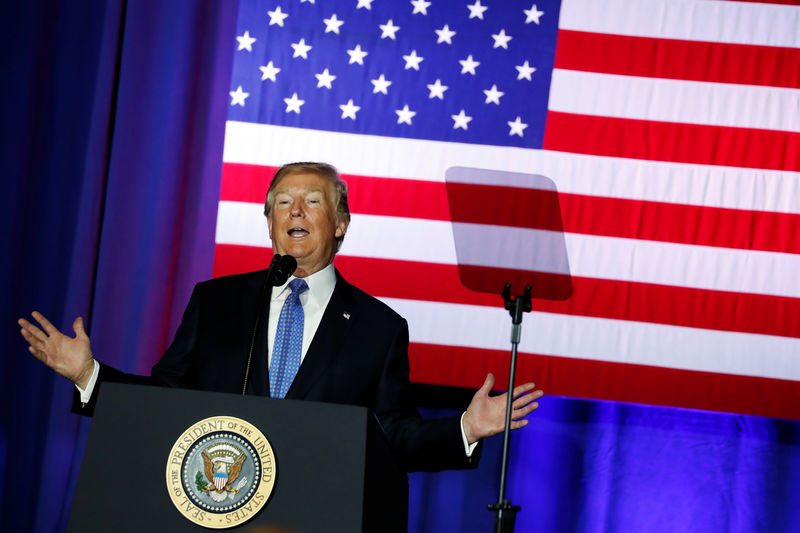By Marc Jones
LONDON (Reuters) - The dollar pulled back on Thursday, having risen along with bond yields after President Donald Trump proposed the biggest shake-up of the U.S. tax system in three decades and data bolstered calls for another Fed rate hike this year.
As the dollar's strength ebbed, emerging market currencies and commodities also began to recover, while Wall Street was expected to see a lackluster start having risen on Wednesday in reaction to Trump's tax blueprint.
European stocks and Japan's Nikkei (N225) gave it a cautious thumbs-up too.
Banks (SX7P) rose to seven-week highs, though they then began to fade, while miners struggled (SXPP) and underwhelming results from one of Europe's biggest fashion chains, H&M, (ST:HMb) weighed on retailers. (EU)
The prospect of higher U.S. debt levels and expectations of a Fed hike sent 10-year Treasury yields to their highest since mid-July, with the 2-10 year yield curve steepening to its highest in a month.
"The market had given up on the Trump reflation trade and this is coming back with a bit more detail on tax plans," said Commerzbank (DE:CBKG) analyst Rainer Guntermann.
"At the same time, this gives the Fed more ammunition to hike rates in the coming months."
The week’s dollar rally remained largely intact despite its pre-U.S. trading pause.
It was flat at 93.34 against a basket of currencies <.DXY.> It has gained 2.5 percent since hitting a 2 1/2-year low of 91.35 in mid-September.
Its earlier gains had been most marked against Japan’s yen, as it probed above 113 yen. Traders also eyed a jump in Japan’s 10-year government bond yield toward levels at which the Bank of Japan would be expected to buy bonds to maintain its zero percent target for long-term rates.
Euro/dollar held just above $1.1775 <EUR=>, with European benchmark bond yields climbing in the slipstream of Treasuries.
The 10-year yield gap between U.S. and German debt widened to 185 basis points, however, its widest since early July.
Emerging markets were the big losers from the dollar and Treasury yield spike higher. MSCI’s emerging markets equity index was down 0.5 percent (MSCIEF) and on course for its sixth straight daily decline.
That would be the index’s longest losing streak since May 2016 and it is also down almost 4 percent in the last 10 days.
TAXING TIMES
Trump's tax plan offered to lower corporate income tax rates, cut taxes for small businesses and reduce the top income tax rate for individuals.
Also helping to boost the dollar, the plan included lower one-time low tax rates for companies to repatriate profits accumulated overseas, which analysts say would lead to a temporary phase of sizable dollar buying.
Others noted though it could be an uphill battle to get the changes approved. "It is hard to expect this proposal to pass Congress smoothly." Takafumi Yamawaki, chief fixed income strategist at J.P. Morgan Securities.
"We have to pay attention to how the Republicans will view this," he added "It is possible that the net fiscal spending will be smaller than the stock markets expect."
For now though, that seemed too far away to worry about. The euro
There was also data in play. German inflation figures were dribbling in higher while economists were also resasured by a rise in euro zone-wide economic confidence readings.
YIELDS
The greenback had checked back against the yen <JPY=> easing to 112.65 yen having hit a 2-1/2-month high of 113.26 yen
The Canadian dollar
Canada's loonie was last at C$1.2475 to the U.S. dollar, having earlier slid to its lowest in a month.
In anticipation of a rate rise in December, U.S. bond yields jumped with the two-year note (US2YT=RR) rising to a nine-year high of 1.49 percent.
Comments earlier in the week from Fed Chair Janet Yellen that the central bank needed to continue with gradual rate hikes have cemented expectations for policy tightening by year-end.
New orders data on Wednesday for U.S.-made capital goods also grew more than expected, helping to boost optimism in the economy's outlook.
The 10-year yield rose as far as 2.357 percent (US10YT=RR), its highest in more than two months, while the 30-year bond yield (US30YT=RR) climbed to 2.901 percent having seen its biggest one-day rise in almost seven months.
Commodities prices were also clawing back having been dented by the revitalised dollar.
Tensions in northern Iraq helped Brent (LCOc1) back to $58.271 a barrel, just down from Tuesday's 26-month peak of $59.49, while U.S. West Texas Intermediate crude (WTI) (CLc1) fetched $52.67 per barrel to strike a new five-month high.

Gold